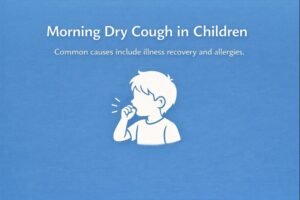Morning Dry Cough in Children: Common Causes and Awareness
A dry cough after waking is relatively common in children. Overnight, mucus can settle in the throat, and coughing in the morning helps move it. Many children cough for several weeks after a cold, while allergies can contribute to longer-lasting symptoms.
First Aid & Community Relevance (Canada)
Parents, caregivers, teachers, and childcare staff often notice morning cough patterns during drop-off or breakfast routines. Awareness supports comfort, reduces worry, and encourages conversations about possible triggers in home, school, and seasonal environments.
Scenario (Mild & Realistic)
A 7-year-old occasionally coughed after waking, especially during spring pollen season. They felt well otherwise and participated normally at school. Symptoms settled once the pollen count dropped.
Possible Reasons for Morning Dry Cough
Respiratory Illness Recovery
A cough can linger for several weeks after colds or other respiratory infections. This is usually due to sensitive airways clearing residual mucus.
Allergies (Common Cause)

-
Tree and grass pollen
-
Mould spores
-
Outdoor plant allergens
Year-round (perennial) triggers may include:
-
House dust
-
Pet dander
-
Indoor mould
-
Irritants such as cigarette smoke
Allergies may contribute to mucus drainage overnight, surfacing as dry cough in the morning.
Airway Irritation / Asthma Awareness
Some children with asthma may cough more after exercise, cold air, or at night. Wheezing or breathing discomfort throughout the day can be a related sign. Only a healthcare professional can assess asthma.
Reflux Awareness
Acid reflux (GERD) may be associated with coughing in some children. Heartburn is one possible symptom, though not always present.
Associated Symptoms to Observe
Parents or caregivers may notice:
-
Sneezing
-
Runny or stuffy nose
-
Watery eyes
-
Dark under-eye circles
-
Mouth breathing
-
Occasional wheezing (with asthma awareness)
Patterns across seasons, weather, indoor environments, or exposure to pets may provide helpful clues.
Comfort Measures & Household Awareness
Families commonly explore:
-
Minimizing exposure to known irritants (e.g., smoke)
-
Regular cleaning to reduce indoor dust
-
Monitoring pollen seasons for outdoor play or open windows
-
Maintaining good hydration
Humidifiers can provide moisture in dry indoor air, but require regular cleaning to prevent mould.
When to Seek Assessment
Healthcare professionals can help when:
-
The cough is persistent
-
Symptoms disrupt sleep or activities
-
Breathing seems difficult
-
Fever or lethargy accompany respiratory symptoms
These conversations help distinguish allergies, illness recovery, asthma, or other causes.
FAQ (Educational)
How long can a cough last after a cold?
Some children cough for several weeks even after other symptoms resolve.
Is morning cough always allergies?
No. Allergies are common but not the only cause.
Can indoor air quality affect cough?
Yes. Dry air, dust, smoke, or pet dander may contribute.
Should persistent cough always be evaluated?
Persistent, disruptive, or unclear symptoms are often discussed with health professionals.
Educational Note
This material supports first aid and public health awareness. Morning cough in children can have many explanations; healthcare professionals can help assess persistent or concerning symptoms.
